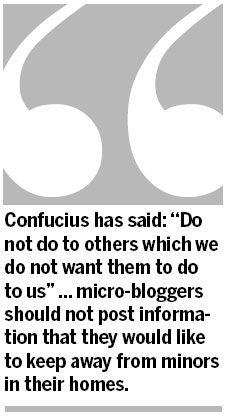
Is micro-blogging good or bad? Is there need to rein it in? Experts are divided in their opinions.
Huang Hu
Weibo can do with some cleansing
Though micro-blogs or weibo have emerged as a rapid-fire social information-sharing platform, they have inherent defects, including a low threshold for posting messages, one-sided information and, more often than not, allowing people to indulge in emotional outbursts.
Sometimes information posted on micro blogs, even though true and unintentional, can have harmful effects on society, other micro-bloggers and the information providers themselves. For instance, micro blogs that reveal a person's daily schedule could be a source of information for wrongdoers, who could use it to choose the time and location of their crimes.
Quite often, micro-bloggers come across unauthenticated or even false information and are thus misled. Some users post micro blogs in the name of charity to prompt others to forward the posts to make profit or achieve ulterior motives. One well-known example is a Tencent micro-blogger called Guo Yao who impersonated the relative of a victim of the high-speed train collision in Wenzhou, Zhejiang province, on July 23, and succeeded in getting donations from sympathetic netizens.
Hence, despite their effectiveness and efficiency in helping charity, the credibility of micro blogs have been damaged because they allow the spread of rumors and false information. That's why some critics have begun questioning the ethics of micro-blogging.
Essentially, micro-blogging is an emerging means of message transmission, though it has certain characteristics that differentiate it from the traditional mode of spreading information and news. It is thus inappropriate to criticize micro-blogging for want of ethics, something that the traditional media has.
One typical feature of micro blogs is that the majority of users are grassroots people, although today elites have also joined the trend. This feature should be taken into account when determining the moral baseline of micro-blogging. In this sense, the basic ethics that micro-bloggers should follow is to post their personal experiences - and only experiences and stories - that they would like to share even with minors in their homes.
The reason why micro blogs are full of false news and information is that many users irresponsibly forward unauthenticated information. Since most of the micro-bloggers are grassroots people, they are incapable of reporting what is happening around them like professional journalists, because they are not qualified or capable of investigating incidents and people and judging whether the information provided is true or not.
Therefore, it is important for micro-bloggers to post only their firsthand experiences. Some people underestimate the impact of spreading rumors and false information on micro blogs, perhaps because they are scotched immediately. Indeed, rumors that survive more than three days on micro blogs are rare.
The basic characteristic of mass communications is that they grant information receivers anonymity. In other words, information providers for mass communications never know who the information receivers are and where they are. Despite the stunning efficiency of rebutting rumors, one can never be sure that users will get and accept the rebuttals. So some damage caused becomes irreparable.
In such cases, prevention is most important, and ethics require micro-bloggers to share their true stories, experiences and feelings only in order to curb the flow of false information.
Furthermore, micro-bloggers can cause other impacts apart from helping spread rumors and false information. Micro blogs are an open and instant message broadcast platform with a wide range of users, including adults and minors. It is, therefore, necessary that the information flowing through them is healthy to ensure that minors are not harmed.
Information related to pornography, superstition and violence does not have place in society and thus should not appear on micro blogs. This is not to spoil people's appetite for information. But people's thirst for information is somewhat overstated and even distorted nowadays, causing information pollution on micro blogs, misguiding young people about the importance of values, disturbing social order and even endangering State security.
Micro-bloggers should not post information that they would like to keep away from minors in their homes.
The author is professor at and vice-director of Journalism School, Fudan University.